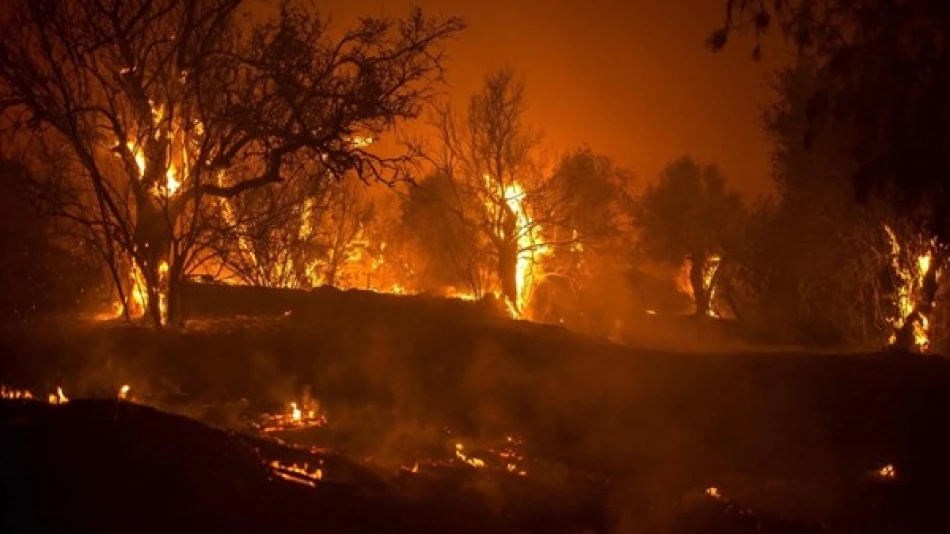
Devastating Forest Fire Injures Dozens in Cyprus
Cyprus Wildfire Crisis Exposes Mediterranean Region's Growing Vulnerability to Climate Disasters
A rapidly spreading wildfire near Cyprus's coastal city of Limassol has killed at least two people and injured dozens more, forcing mass evacuations across 16 villages as flames consumed 100 square kilometers of forest and agricultural land. The blaze, which erupted Wednesday in mountainous terrain north of the popular tourist destination, highlights the Mediterranean's escalating wildfire risk amid increasingly severe weather patterns.
Deadly Blaze Traps Victims on Rural Roads
Police discovered two bodies in a fire-engulfed vehicle on a rural road, where the victims appeared trapped by rapidly advancing flames. The fire originated in a mountain village approximately 20 kilometers north of Limassol and spread with alarming speed, driven by strong winds that have become characteristic of the region's fire season.
Sixteen additional people sustained injuries and were transported to Limassol hospitals, according to rescue service officials. The human toll reflects a broader pattern across Southern Europe, where wildfires increasingly threaten populated areas as urban development expands into fire-prone landscapes.
Widespread Destruction Across Rural Communities
The fire consumed diverse terrain including forests, woodland areas, and agricultural plots while destroying dozens of homes. Local media reported significant livestock and pet casualties, representing substantial economic losses for rural communities already facing agricultural pressures.
Authorities ordered evacuations of 16 villages, three camping sites, and multiple youth camps as flames advanced rapidly through the countryside. Many residents fled their homes in panic, echoing scenes witnessed across the Mediterranean during recent fire seasons in Greece, Turkey, and southern Italy.
Tourism Infrastructure Remains Protected
Tourist resorts along Limassol's coastline remained unaffected by the blaze, preserving Cyprus's crucial tourism sector that contributes approximately 15% of the island's GDP. This geographic separation between the fire zone and coastal tourism areas may limit broader economic impacts, though the disaster underscores risks to the island's inland communities.
Mediterranean Fire Crisis Intensifies
Cyprus joins a growing list of Mediterranean nations grappling with increasingly severe wildfire seasons. The island's fire follows devastating blazes in Greece, Spain, and Portugal over recent summers, reflecting regional climate trends toward hotter, drier conditions that extend traditional fire seasons.
The pattern mirrors conditions in other fire-prone regions globally, from California's expanding wildfire zones to Australia's intensifying bushfire seasons. Small island nations like Cyprus face particular vulnerability due to limited firefighting resources and constrained evacuation options.
Policy Implications for Small Island States
This incident will likely accelerate Cyprus's disaster preparedness investments and regional cooperation agreements. The European Union has been expanding its firefighting aircraft fleet and early warning systems specifically to address Mediterranean fire risks, with Cyprus positioned to benefit from these continental resources.
The fire's rapid spread despite relatively small geographic scale demonstrates how quickly disasters can overwhelm local response capabilities on islands, potentially influencing EU policy toward pre-positioned emergency resources in vulnerable member states.
Economic and Environmental Consequences
Beyond immediate human casualties, the fire represents significant ecological damage in a region where forest recovery can take decades. Cyprus's limited landmass makes each burned hectare proportionally more significant than similar fires in larger countries, potentially affecting water resources, soil stability, and biodiversity for years.
The agricultural losses will likely impact local food security and rural livelihoods, continuing a trend where climate-related disasters disproportionately affect traditional farming communities across Southern Europe.
Most Viewed News

 Layla Al Mansoori
Layla Al Mansoori






